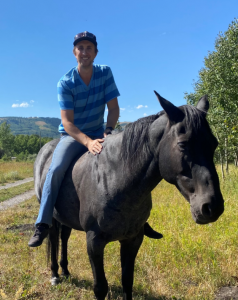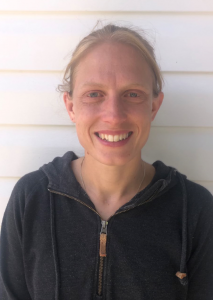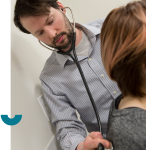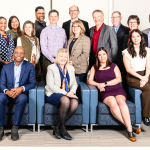Share
Dr. Bryan Ward Memorial Endowment Fund recipients: 2020 and 2021
Back to MessengerJump to section:
2020 recipient: Dr. Scott MacLeod
2021 recipient: Dr. Adrienne Stedford
About the Dr. Bryan Ward Memorial Endowment Fund
“The variety of practice and connection to community had me hooked early on and confirmed rural medicine was the right career path for me.” – Dr. Scott MacLeod
Recognizing 2020’s recipient of the Dr. Bryan Ward Memorial Endowment Fund

Why rural practice?
My grandfather was a rural family physician and had a strong influence on my interest in medicine and working rurally. He had a wide range of stories about his career—from getting paid in chicken eggs to having to snowmobile to patients’ houses in snow storms to do home visits.
Growing up rurally, it was a long time before I realized there were other career paths for physicians besides a generalist family physician. When I broke my arm, it was my family doctor who saw me in his clinic, then again in the emergency room to put a cast on. This same doctor removed a friend’s appendix.
During my medical training, I was fortunate to do rural rotations and experience diverse rural practices firsthand. The variety of practice and connection to community had me hooked early on and confirmed rural medicine was the right career path for me. Working as a rural family physician has given me the opportunity to have a broad scope of practice where I use aspects from all medical specialties every day.
What does rural practice mean to you?
I don’t believe there is a more challenging career in medicine than rural family medicine. I am constantly amazed at the breadth of knowledge and skills preceptors of mine possess.
As a rural GP, you’re the first point of contact for such a wide variety of presenting issues. After only two or three years of residency, the thought of being responsible and prepared for all these presentations is daunting. However, it’s very rewarding when you are able to solve a patient’s issue, provide them with care close to home or put them in contact with a specialist colleague for further management. Most patients in rural communities are very grateful for the care you provide and it’s an honor to be involved in their medical journey. At the end of the day, it is about the patient and doing what’s best for them.
What advice would you give someone who is considering rural practice?
Immerse yourself in your rural community. Join clubs, try new sports and meet new people. As a new medical student or resident, people will open their doors to you. There are so many interesting and rewarding experiences to be had in rural communities.
As well, I find the happiest rural physicians often seem to be the most involved in their communities. The best mentors I’ve worked with are advocates for their patients as well as their communities. These physicians are often long-standing residents and their advocacy work extends far beyond their medical practice.
Dr. Scott MacLeod completed his medical education at the University of Alberta where he took part in the Integrated Community Clerkship and spent 10 months of his training in St. Paul. He completed residency in family medicine through the University of Calgary’s rural program in Lethbridge, during which time he was stationed in High River, Blairmore and Pincher Creek. He also completed his Family Practice Anesthesia training at the University of Calgary. Dr. MacLeod is now 10 months into independent practice in High River.
“My favourite part of rural practice is the sense of community, both in and outside of medicine.” – Dr. Adrienne Stedford
Recognizing 2021’s recipient of the Dr. Bryan Ward Memorial Endowment Fund

Why rural practice?
During my first year as a medical student, I had an opportunity to spend a weekend shadowing physicians in Vanderhoof, B.C. The interesting medicine I was exposed to that weekend and the rural lifestyle of the physicians really left an impression on me.
I also love the versatility of rural practice! With limited access to in-person specialists and resources, rural medicine pushes you to think outside of the box and step up in all aspects of medicine. Seeing a patient from a new acute illness presentation, through their hospital admission and/or in follow-up in the community is really the most amazing way to continue to learn and grow as a physician.
What does rural practice mean to you?
My favourite part of rural practice is the sense of community, both in and outside of medicine. Working amongst people you know well and share common goals with is a really positive experience. I’m also a big fan of the sub-10-minute commute and still being able to live with outdoor recreation at my doorstep.
In terms of challenges, we all want the best for our patients and rural patients face additional barriers to accessing some aspects of health care. This adds an additional layer of complexity in figuring out travel/transport and timely access to testing and follow up. I’ve learned that taking the time to get to know your patients, their social context and what is valuable and important to them is really the foundation of providing effective medical care. The challenges in each community are unique and can change with the weather!
What advice would you give someone who is considering rural practice?
For me personally, the most crucial elements of successful rural practice are being adaptable and ready to step up in unanticipated situations, being engaged with and supportive of your colleagues, and being interested in continually expanding your knowledge base.
For medical students and residents interested in rural medicine, it’s important to acknowledge that medical training is no walk in the park and showing up alone in a small community as a learner can be challenging and sometimes lonely. At the end of the day, being able to enjoy rural living is just as important as enjoying the medicine. When you go rural, make sure you get out and explore the community you are in. Find out what groups are in the community and ask to join them while you are in town, or volunteer for an event. Rural medicine has something for everyone, and the communities usually do too, you just need to explore.
Dr. Adrienne Stedford completed rotations as a medical student in Valemount and Kimberley, B.C. As a medical resident in Alberta, she spent time in Claresholm, Crowsnest Pass and Banff, as well as two months in Whitehorse, YT. As she prepares to move into independent practice, she’s looking forward to getting settled in one spot to begin building the relationships with colleagues and patients that make medicine so rewarding!
About the Dr. Bryan Ward Memorial Endowment Fund
The Dr. Bryan Ward Memorial Endowment Fund is awarded annually to a medical student or resident with an interest in rural family practice and professionalism. Dr. Ward was a champion for rural family practice, spending 15 years serving a rural community before transitioning to administrative medicine with CPSA as Deputy Registrar. To recognize Bryan’s many contributions to the medical profession and to encourage students and residents to choose rural family practice, CPSA and the University of Calgary created the Dr. Bryan Ward Memorial Endowment Fund in 2014.
For more information, or to donate, visit Dr. Bryan Ward Memorial Endowment Fund.
























Comments for this post are now closed. If you would like to share your feedback on this topic, please email support@cpsa.ca.